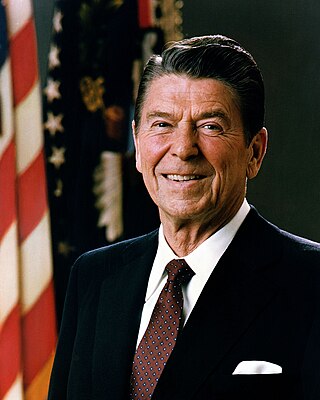
Ronald Wilson Reagan was an American politician and actor who served as the 40th president of the United States from 1981 to 1989. A Republican, he previously served as the 33rd governor of California from 1967 to 1975 and as president of the Screen Actors Guild from 1947 to 1952 and from 1959 until 1960.

The 1980 United States presidential election was the 49th quadrennial presidential election, held on Tuesday, November 4, 1980. The Republican ticket of Ronald Reagan and George H.W. Bush defeated incumbent Democratic president Jimmy Carter and incumbent vice president Walter Mondale in a landslide victory.

John Bayard Anderson was an American lawyer and politician who served in the United States House of Representatives, representing Illinois's 16th congressional district from 1961 to 1981. A member of the Republican Party, he also served as the Chair of the House Republican Conference from 1969 until 1979. In 1980, he ran an independent campaign for president, receiving 6.6% of the popular vote.
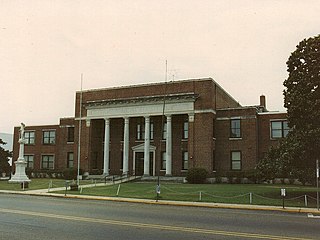
Neshoba County is located in the central part of the U.S. state of Mississippi. As of the 2020 census, the population was 29,087. Its county seat is Philadelphia. It was named after Nashoba, a Choctaw chief. His name means "wolf" in the Choctaw language.

Philadelphia is a city in and the county seat of Neshoba County, Mississippi, United States. The population was 7,118 at the 2020 census.

A Reagan Democrat is a traditionally Democratic voter in the Northern United States, referring to working class residents who supported Republican presidential candidates Ronald Reagan in the 1980 or the 1984 presidential elections, or George H. W. Bush during the 1988 presidential election. The term Reagan Democrat remains part of the lexicon in American political jargon because of Reagan's continued widespread popularity among a large segment of the electorate.

In American politics, the Southern strategy was a Republican Party electoral strategy to increase political support among white voters in the South by appealing to racism against African Americans. As the civil rights movement and dismantling of Jim Crow laws in the 1950s and 1960s visibly deepened existing racial tensions in much of the Southern United States, Republican politicians such as presidential candidate Richard Nixon and Senator Barry Goldwater developed strategies that successfully contributed to the political realignment of many white, conservative voters in the South who had traditionally supported the Democratic Party. It also helped to push the Republican Party much more to the right relative to the 1950s.
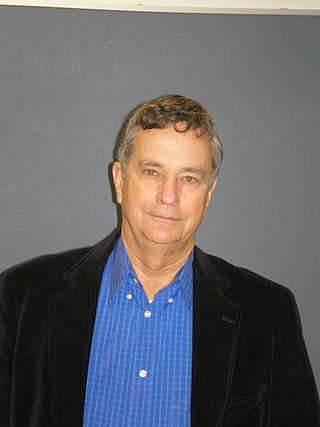
William Hodding Carter III is an American journalist and politician. He was Assistant Secretary of State for Public Affairs in the Jimmy Carter administration.

The Neshoba County Fair, also known as Mississippi's Giant House Party, is an annual event of agricultural, political, and social entertainment held a few miles from Philadelphia, Mississippi. The fair was first established in 1889 and is the nation's largest campground fair. The event usually starts at the end of July and lasts a week.
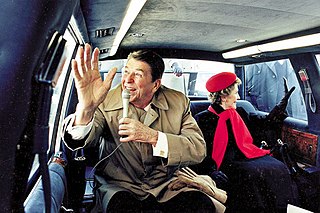
This is the electoral history of Ronald Reagan. Reagan, a Republican, served as the 40th president of the United States (1981–89) and earlier as the 33rd governor of California (1967–75). At 69 years, 349 days of age at the time of his first inauguration, Reagan was the oldest person to assume the presidency in the nation's history, until Donald Trump was inaugurated in 2017 at the age of 70 years, 220 days. In 1984, Reagan won re-election at the age of 73 years, 274 days, and was the oldest person to win a US presidential election until Joe Biden won the 2020 United States presidential election at the age of 77 years, 349 days.
Ronald Reagan was the 40th President of the United States (1981–1989). A Republican and former actor and governor of California, he energized the conservative movement in the United States from 1964. His basic foreign policy was to equal and surpass the Soviet Union in military strength, and put it on the road to what he called "the ash heap of history". By 1985, he began to co-operate closely with Soviet leader Mikhail Gorbachev–they even became friends–and negotiated large-scale disarmament projects. The Cold War was fading away and suddenly ended as Soviets lost control of Eastern Europe almost overnight in October 1989, nine months after Reagan was replaced in the White House by his vice president George H. W. Bush, who was following Reagan's policies. The Soviet Union itself was dissolved in December 1991. In terms of the Reagan doctrine, he promoted military, financial, and diplomatic support for anti-Communist insurgencies in Afghanistan, Nicaragua, and numerous other countries. For the most part, local communist power collapsed when the Soviet Union collapsed.

In 1980, Ronald Reagan and George H. W. Bush were elected president and vice president of the United States. They defeated the incumbent Democratic President Jimmy Carter and Vice President Walter Mondale.

The 1984 United States presidential election in Florida took place on November 6, 1984. All fifty states and the District of Columbia were part of the 1984 United States presidential election. Florida voters chose 21 electors to the Electoral College, which selected the president and vice president of the United States.

The 1984 United States presidential election in Mississippi took place on November 6, 1984. All fifty states and the District of Columbia, were part of the 1984 United States presidential election. Mississippi voters chose seven electors to the Electoral College, which selected the president and vice president of the United States.
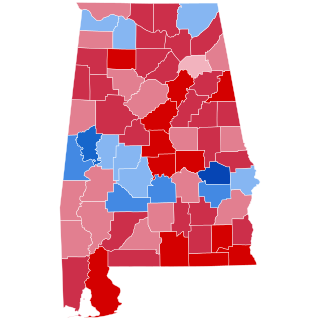
The 1984 United States presidential election in Alabama took place on November 6, 1984. All 50 states and the District of Columbia were part of the 1984 United States presidential election. Alabama voters chose 9 electors to the Electoral College, which selected the president and vice president of the United States.

The 1984 United States presidential election in Georgia took place on November 6, 1984. All 50 states and the District of Columbia, were part of the 1984 United States presidential election. Georgia voters chose 12 electors to the Electoral College, which selected the president and vice president of the United States.
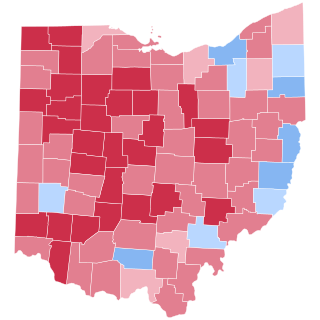
The 1980 United States presidential election in Ohio took place on November 4, 1980. All 50 states and The District of Columbia were part of the 1980 United States presidential election. State voters chose 25 electors to the Electoral College, who voted for president and vice president.

The 1980 United States presidential election in Oregon took place on November 4, 1980. All fifty states and The District of Columbia were part of the 1980 United States presidential election. Voters chose six electors to the Electoral College, who voted for president and vice president.

The 1980 United States presidential election in Mississippi took place on November 4, 1980. All fifty states and The District of Columbia were part of the 1980 United States presidential election. Mississippi voters chose seven electors to the Electoral College, who voted for president and vice president.
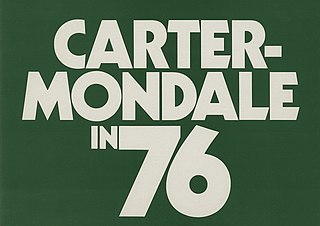
The 1976 presidential campaign of Jimmy Carter resulted in the election of Jimmy Carter and his running mate Walter Mondale's as president and vice president of the United States, defeating incumbent Republican President Gerald Ford and his running mate Bob Dole. Carter, a Democrat and former governor of Georgia, launched his presidential bid in December 1974, as the Constitution of Georgia barred him from running for a second term as governor. In the wake of the Watergate scandal, the declining popularity of President Ford due to his pardon of Nixon, and the severe recession of 1974–75, many Democrats were sure of victory in the 1976 presidential election. As a result, 17 Democrats ran for their party's nomination in 1976. Carter's opponents mocked his candidacy by saying "Jimmy, who?", for his being relatively unknown outside Georgia. In response, Carter began saying "My name is Jimmy Carter, and I'm running for president." Carter extensively campaigned in the primaries, and in the end received 39.19% of his party's primary votes.






















